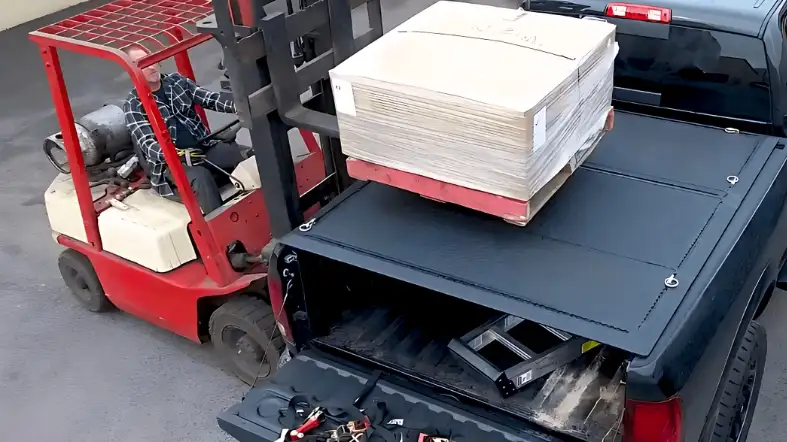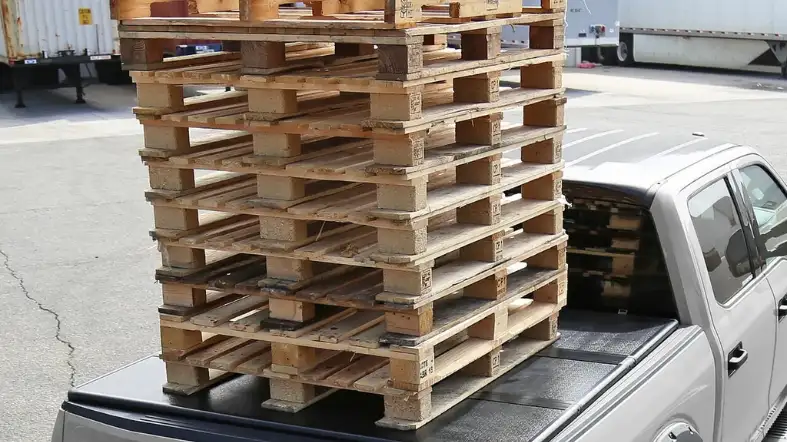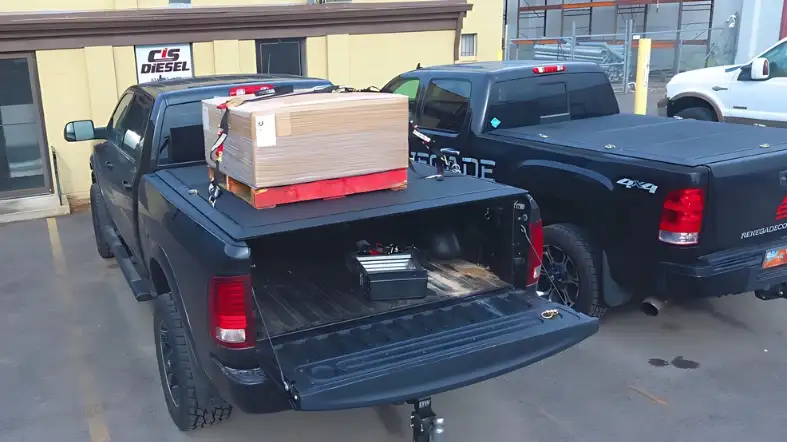Are you wondering if it’s safe to put weight on a tonneau cover? Perhaps you’re planning a trip and considering using it as an additional storage area.
Well, you’re in the right place! In this article, we’ll explore the common question, “Can you put weight on a tonneau cover?”
We’ll discuss weight limitations and potential risks.

Can You Put Weight On A Tonneau Cover?
Yes, you can put weight on a tonneau cover. However, not all tonneau covers are designed to support weight.
Soft covers, such as vinyl or canvas, are not designed to bear weight and can be easily damaged if you try to place any weight on them.
Hardcovers, however, can generally support some weight, but it depends on the specific model and manufacturer.
Some hardcovers are designed to support up to 500 pounds, while others can only support 50-100 pounds.
It is important to keep in mind that exceeding the weight capacity can cause damage to both the cover and your truck bed.
Weight Capacity And Limitations Of Tonneau Covers
Here are the weight capacity and limitations of the tonneau cover:
Soft Roll-Up Tonneau Covers
Soft roll-up tonneau covers offer convenience and flexibility while providing moderate protection for your truck bed.
These covers typically consist of a vinyl or fabric material that can be rolled up when not in use.
Soft roll-up tonneau covers have a weight capacity ranging from 200 to 500 pounds, depending on the specific model and manufacturer.
It is important to note that exceeding the weight capacity of a soft roll-up tonneau cover may result in damage to the cover or compromised security.
To maximize the lifespan of your soft roll-up tonneau cover, avoid exceeding its weight capacity and ensure that the weight is distributed evenly across the truck bed.
Hard Folding Tonneau Covers
Hard folding tonneau covers offer enhanced security and protection for your truck bed and cargo.
These covers are constructed with durable materials such as aluminum or fiberglass panels, providing a rigid and secure barrier.
The weight capacity of hard folding tonneau covers generally ranges from 500 to 1,500 pounds, depending on the specific design and construction.
Although hard folding tonneau covers can handle heavier loads compared to soft roll-up covers, it is essential to adhere to their weight capacity to prevent structural damage or compromise the cover’s functionality.
Make sure to distribute the weight evenly across the truck bed when loading heavy cargo to maintain stability and protect your tonneau cover.
Retractable Tonneau Covers
Retractable tonneau covers offer a sleek and versatile solution for truck bed protection.
These covers are typically made of aluminum or polycarbonate panels that retract into a compact housing at the front of the bed.
The weight capacity of retractable tonneau covers can vary significantly depending on the specific model and manufacturer.
On average, retractable tonneau covers have a weight capacity ranging from 500 to 1,500 pounds.
However, it is crucial to consult the manufacturer’s specifications for your specific tonneau cover model to determine its exact weight capacity.
Exceeding the weight limit may strain the cover’s components and compromise its functionality.
Hinged Tonneau Covers
Hinged tonneau covers offer robust protection and security for your truck bed.
These covers are constructed with durable materials such as aluminum or fiberglass, and they feature a hinged design that allows easy access to the truck bed.
The weight capacity of hinged tonneau covers varies depending on the specific design, construction, and manufacturer.
In general, hinged tonneau covers have a weight capacity ranging from 500 to 1,500 pounds.
However, it is crucial to verify the weight limit specified by the manufacturer to ensure optimal performance and longevity.
Exceeding the weight capacity may lead to damage, compromised security, or difficulty in opening and closing the cover.
Risks And Potential Damage From Exceeding Weight Limits

Here are some risks and potential damage from exceeding weight limits:
Structural Instability
Exceeding weight limits can compromise the structural integrity of various objects, such as bridges, floors, or even furniture.
Structures are designed with specific weight tolerances in mind, ensuring they can support the intended load safely.
However, when you exceed these limits, the excess weight can strain the materials beyond their capacity, leading to structural failure.
This can result in collapses, cracks, or severe damage, putting everyone in the vicinity at risk.
Equipment Malfunction
Many types of machinery, such as cranes, forklifts, or vehicles, are designed to operate within certain weight limits.
When these limits are exceeded, it puts undue stress on the equipment, increasing the chances of mechanical failure.
The excessive load can strain vital components, causing them to break, wear out quickly, or malfunction unexpectedly.
This can lead to accidents, injuries, and costly repairs or replacements.
Loss of Control
Exceeding weight limits can impair your ability to control vehicles or other moving objects effectively.
When a vehicle is carrying more weight than it is designed to handle, its braking distance increases, making it harder to stop in emergency situations.
Moreover, the extra weight can affect steering and maneuverability, making it challenging to navigate corners or avoid obstacles.
These factors greatly reduce your control over the vehicle and increase the likelihood of accidents.
Environmental Damage
Excessive weight can also cause damage to the environment.
When heavy vehicles traverse roads or bridges with weights beyond the permitted limits, the infrastructure can suffer accelerated wear and tear.
This leads to increased maintenance costs and potential disruptions in transportation.
Moreover, if weight limits are surpassed near environmentally sensitive areas, the additional pressure can harm the ecosystem, including soil erosion, damage to vegetation, or disturbance to aquatic habitats.
Legal Consequences
Exceeding weight limits is not only dangerous but also illegal in many jurisdictions.
Regulatory authorities establish weight restrictions to maintain safety standards and protect infrastructure.
When you disregard these limits, you may face legal consequences such as fines, penalties, or even criminal charges.
Additionally, insurance claims related to accidents or damages caused by exceeding weight limits may be denied, resulting in substantial financial liabilities.
Alternatives To Using A Tonneau Cover For Heavy Loads

Here are the alternatives of using a tonneau cover for heavy loads:
Ratchet Straps and Tie-Downs
Ratchet straps and tie-downs are versatile and reliable tools for securing heavy loads in your truck bed.
Start by positioning your load securely in the bed, making sure it is evenly distributed and properly balanced.
Next, locate suitable anchor points on your truck, such as the bed hooks or cargo tie-downs.
Attach one end of the ratchet strap or tie-down to the anchor point, and then secure the other end to a sturdy point on your load.
Repeat this process for multiple straps, ensuring they are tightened securely to prevent any movement or shifting during transit.
Periodically check the straps during your journey to ensure they remain tight and secure.
Cargo Nets
Cargo nets are an excellent option for containing loose or bulky items that may not fit well under a tonneau cover.
To use a cargo net, place it over your load in the truck bed, ensuring it covers the entire area.
Secure the corners and edges of the net to the truck bed using bungee cords, hooks, or other fastening mechanisms.
Make sure the net is stretched tightly to hold your load in place, preventing it from shifting or falling out during transportation.
Additionally, periodically check the net and its attachments to ensure they are secure throughout your journey.
Truck Bed Extenders
Truck bed extenders are practical accessories that allow you to increase the length of your truck bed, accommodating larger or longer loads.
These extenders typically attach to the tailgate of your truck, providing a secure platform for overhanging items.
To use a truck bed extender, simply install it according to the manufacturer’s instructions.
When loading heavy items, ensure they are properly positioned and secured within the extended bed area.
It’s essential to distribute the weight evenly and secure the load using straps or tie-downs to prevent any imbalance or movement during transit.
Stake Pockets and Side Rails
If your truck bed is equipped with stake pockets or side rails, these can be useful in securing heavy loads without a tonneau cover.
Stake pockets are small openings along the sides of the truck bed, while side rails are raised edges that provide additional containment.
To utilize stake pockets or side rails, position your load within the bed and ensure it is centered and balanced.
Use ratchet straps or tie-downs to secure your load to the stake pockets or side rails, ensuring they are tightly fastened to prevent shifting or instability during transportation.
Regularly inspect the straps and connections to ensure they remain secure throughout your journey.
Custom-Made Solutions
In some cases, you may have unique or irregularly shaped loads that require a custom-made solution.
Consider consulting with a professional fabricator or truck accessories specialist who can create a custom cargo-carrying system tailored to your specific needs.
These solutions may include custom racks, brackets, or other mechanisms designed to secure your heavy loads effectively.
Working with a professional ensures that you have a reliable and safe solution that meets your requirements and provides peace of mind during transportation.
Are Bed Rails Necessary to Support Weight on a Tonneau Cover?
Bed rails for tonneau cover are absolutely necessary to support weight. They play a crucial role in providing stability and security. Without bed rails, the tonneau cover may sag or buckle under heavy loads, potentially damaging the cover and its contents. Invest in sturdy bed rails to ensure that your tonneau cover can efficiently handle the weight it’s designed for.
Frequently Asked Question
What Is The Weight Capacity Of A Tonneau Cover?
The weight capacity of a tonneau cover varies depending on the specific model and brand.
It is generally recommended not to exceed the manufacturer’s specified weight limit.
What Can I Safely Place On Top Of A Tonneau Cover?
A tonneau cover is designed to carry light to moderate-weight loads, such as luggage, sports equipment, or small items.
It is not intended for carrying heavy or bulky items.
Will Place Heavy Objects On A Tonneau Cover Damage It?
Exceeding the weight capacity of a tonneau cover can potentially damage it, compromising its functionality and lifespan.
It is best to avoid placing heavy objects on the cover.
Can I Use A Tonneau Cover As A Platform For Sitting Or Standing?
Tonneau covers are not designed to support the weight of a person sitting or standing on them.
Doing so can cause damage to the cover and may result in injury.
Are There Specific Guidelines For Weight Distribution On A Tonneau Cover?
While there are no strict guidelines for weight distribution on a tonneau cover, it is generally advisable to distribute the weight evenly to minimize stress on the cover and its mounting points.
How Can I Protect My Tonneau Cover When Carrying Heavier Items?
To protect your tonneau cover when carrying heavier items, consider using additional support, such as support bars or a bed extender, to help distribute the weight more evenly across the truck bed and minimize strain on the cover.
Final Words
Now that you have a clear understanding of whether you can put weight on a tonneau cover, it’s important to remember a few key points.
While tonneau covers can handle light to moderate weight loads, exceeding the manufacturer’s weight capacity can lead to damage and reduced functionality.
To protect your tonneau cover and ensure its longevity, avoid placing heavy objects on it and distribute weight evenly.
So, next time you load up your truck, be mindful of the weight limits and keep your tonneau cover in top shape.
